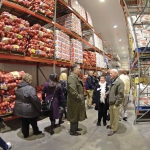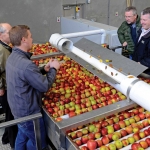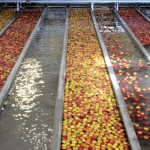Michigan’s capacity to pack superior quality fresh-market apples grew again in 2013, as the state’s packing houses spent the year in a building and remodeling mode.
It was an optimistic response to a bad situation. The packers were effectively shut down by the massive crop failure of 2012, but instead of recoiling, they charged ahead.
The expansion plans were not created in response to the short crop. They were laid earlier in response to a rapidly growing volume of modern varieties coming from high-density plantings made in the last few years.
“Everybody’s updating,” said Hal Roy, chief executive officer of Heeren Brothers, Inc.
Heeren Brothers
On December 11, there was a ribbon-cutting ceremony at Heeren Brothers, which was just starting packing operations at a $22 million state-of-the-art facility on Michigan’s Fruit Ridge just north of Grand Rapids.
The new 178,000-square-foot facility has 15 new controlled atmosphere rooms with a total capacity of 11,000 bins; two grading and packing lines, one for bags, the other for trays and other packages; and sorters that detect internal and external defects and are used for presizing and presorting 60 bins of apples an hour.
Earlier last summer, a new entity called Elite Apple Company opened a new $7 million apple processing and packing facility three miles up the road from Heeren’s.
In the last five years, major renovations have taken place at Riveridge Packing, Jack Brown Produce, Applewood Orchards, and BelleHarvest Sales.
Riveridge Produce Marketing, also on Fruit Ridge, built additional storage and a new packing plant in 2010 at a cost of about $6.5 million.
John Schaefer, president of Jack Brown Produce on Fruit Ridge, said his operation invested $4 million in a high-tech packing line and 50,000 square feet of production and office space in 2009.
BelleHarvest Sales, Inc., in Belding invested $1.1 million in six new controlled-atmosphere storage rooms, on the heels of other improvements to the packing line including a new internal/external near-infrared defect sorter and bagging operation.
Applewood Orchards, Inc., in Deerfield spent $1.1 million on new sizers in 2011, which included internal and external defect sorting.
In Traverse City, the grower members of North Bay Produce have invested more than $5 million over the past six years in new packing and sorting equipment and new controlled-atmosphere storage rooms.
Heeren Brothers broke ground on its new facility in October 2012. As well as storage and packing features, it has amenities for employees, such as workout facilities, lounge, and break room; energy-saving refrigeration equipment and other energy-conscious features; and changes that exceed food-safety regulations and initiatives, including SQF (Safe Quality Food) 2000 and provisions of the Bioterrorism Act of 2002.
It contains the only Washington-style wet line in Michigan.
In the last decade, Heeren launched a series of subsidiaries and joint ventures—including All Fresh GPS, Ridgeking Apple Packing and Storage, and Gourmet Specialty of Michigan.
Through its subsidiaries and joint ventures, Heeren owns some orchards leased to others, stores and packs apples for more than 75 family-owned Michigan growers, and packs and sells more than 20 percent of all fresh apples grown in Michigan. Six members of the third and fourth generations of Heerens have roles within the company.
In the new facility, Heeren Brothers will use 60,000 square feet for produce distribution and 11,000 square feet for corporate offices. Its packing arm, Ridgeking Apple Packing, will utilize the remaining 107,000 square feet for apple storage and packing.
In 2011, Ridgeking—Heeren’s storage and packing arm—joined forces with Applewood Orchards to create All Fresh GPS, which focuses exclusively on marketing Michigan apples. GPS stands for grower/packer/shipper.
Elite Apple
All Fresh GPS will also market the million bushels of apples expected to be packed in a new facility called Elite Apple, which is located three miles from Heeren Brothers and includes some of the same players. It began operations in August.
Applewood Orchards, located across the state in Deerfield, Michigan, and owned by the Swindeman family, is one of seven partners in Elite Apple, which built a new $7 million, 55,000-square-foot packing facility that opened in August. Applewood Orchards has licenses to produce Kiku and Piñata club apples, which are marketed through All Fresh GPS.
The Elite Apple facility includes the latest equipment, including sorting machines from New Zealand that can scan apples and detect external and internal defects. The facility can pack bags or molded display packs. Elite Apple does not store apples.
Six years ago, a plan was being developing to the build a new facility to pack SweeTango apples. That plan fell apart, and some of the partners in that project regrouped to form Elite Apple, using the site that had already been acquired. •




Any sense for how much packing capacity there is in the state of Michigan?